Scottish politics in 2022 - five things to watch
- Published
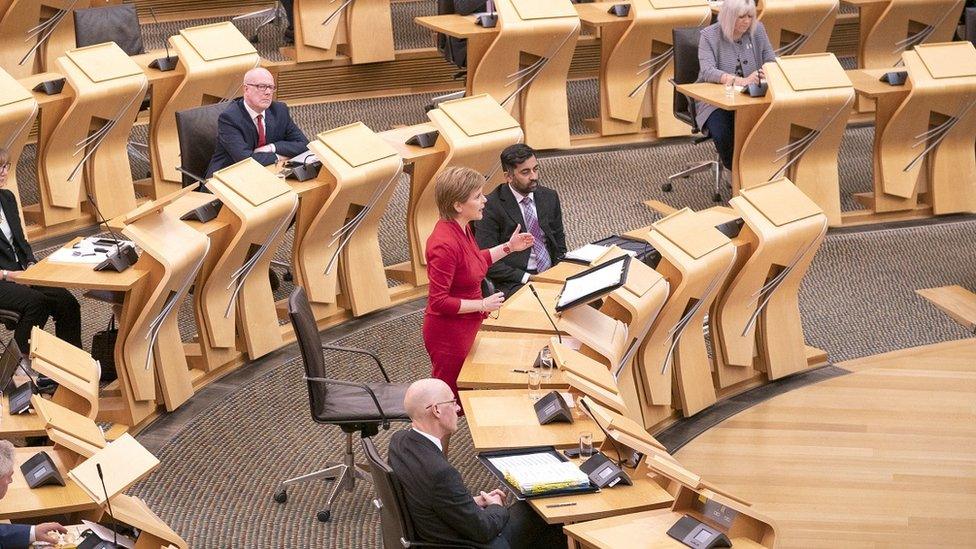
Holyrood is back in session for the 2022 term, with Nicola Sturgeon set to take questions at the inaugural first minister's questions of the year. As Scotland emerges from the Covid-19 pandemic, what big issues will dominate politics in the coming months?

1. Covid-19
Everyone will hope that 2022 is a year where coronavirus doesn't hang over politics, and indeed daily life.
However, even with politicians dropping more and more hints about ending restrictions and finding ways of "living with Covid", the pandemic and its legacies will still play a massive role in the immediate future.
To start with, there will be judge-led inquiries, both at a Scottish and UK-wide level, to pick over how ministers in Edinburgh and London handled the unfolding crisis.
And then there is the recovery from the pandemic itself, in sectors from physical and mental health services to the economy and education.
Will testing remain free and readily available? Will people need a fourth dose of vaccine? Will school pupils sit traditional exams this summer? Will workers be heading back to offices on a more regular basis? Will hospitality businesses manage to get back on their feet?
The unanswered questions still feel endless, but the hope will be that this is the year where we can begin to move on from them.
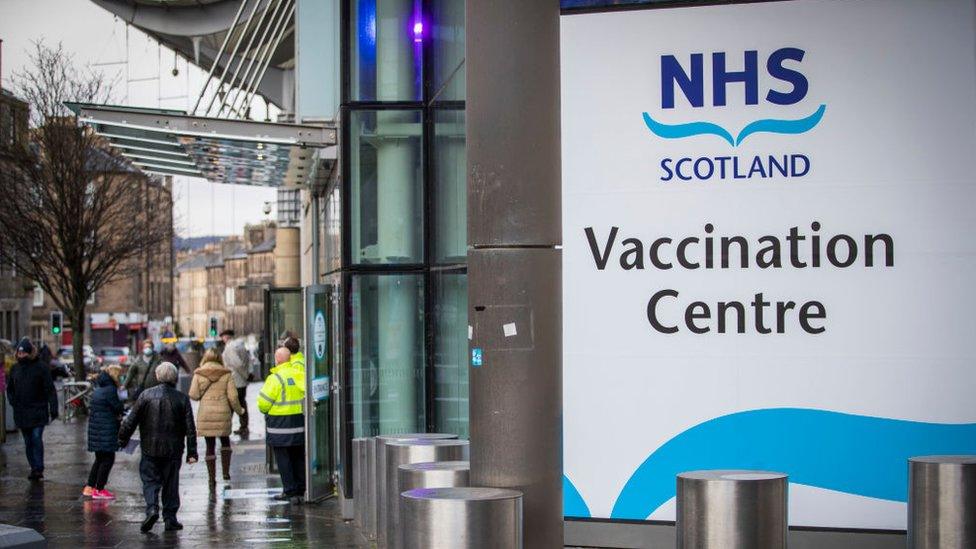
2. Local government
This is set to be a big year for local government, not least because there are elections to all 32 of Scotland's councils in May.
There are a host of political questions for every party involved, with Labour fighting desperately to recapture second place from the Conservatives, the Alba Party challenging the SNP for pro-independence votes, the Lib Dems battling for relevance after slipping to four Holyrood seats last year and the Scottish Greens hoping to capitalise on joining the government.
However, there are also some rather more immediate questions facing councillors, as they attempt to set their budgets for the year ahead.
The Scottish government's budget plans are sure to sail through Holyrood thanks to the SNP-Green partnership agreement, but they will not do so without howls of protest from local government.
Council leaders from across the political spectrum are deeply unhappy with the level of funding on offer, and unanimously backed an "urgent" demand for talks with Nicola Sturgeon about the "totally unacceptable" settlement.
And while Finance Secretary Kate Forbes has given them free reign over local tax rates for the first time since the SNP came to power in 2007, many see this as a poisoned chalice. Councillors will hardly be thankful for the "opportunity" to hike council tax on the eve of an election, particularly if they feel forced to do so.
Somehow this still isn't the end of the conflicts between Holyrood and town halls, with proposals for a National Care Service also raising hackles about the idea of more local services being centralised.
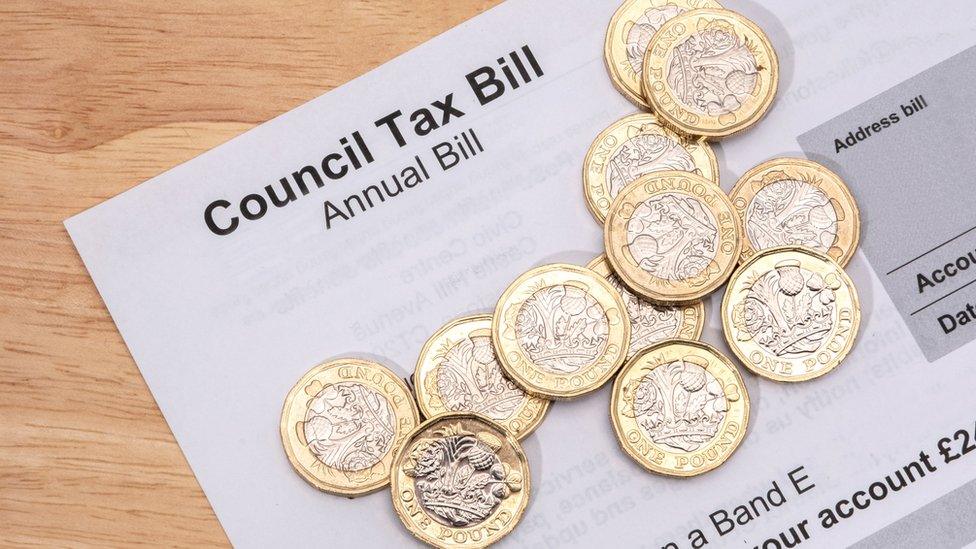
3. Legislation
MSPs start the year with plenty in their in-trays, with a fresh batch of election pledges to be delivered and indeed a few hanging over from last term too.
Attempts to reform the Gender Recognition Act repeatedly stalled in the previous parliamentary session as the government commissioned a series of consultations before being consumed by Covid-19. The SNP has committed to pushing through changes this term, and a bill is anticipated in the near future.
MSPs can at least be trusted to discuss the matter in a reasonably measured fashion, in contrast to some of the culture wars commentators who fan the flames of debate online.
Controversy is more or less guaranteed, though - those who responded to the aforementioned consultations, external were in broad agreement about one thing, which was how "toxic" the "highly polarised" issue has become.
Assisted dying is also back on the political agenda with Lib Dem Liam McArthur's legislative proposal, external gaining support from corners including former SNP Health Secretary Jeane Freeman.
A consultation which closed before Christmas apparently elicited an enormous volume of responses, and a draft bill is likely to be published in the coming months.
There will be more opposition bills on contentious matters to come too, with the Conservatives pushing a "right to recovery" in response to record levels of drug-related deaths.
The difficulties the government has faced in getting to grips with this issue were underlined at the turn of the year when the heads of its drugs death taskforce resigned in frustration.
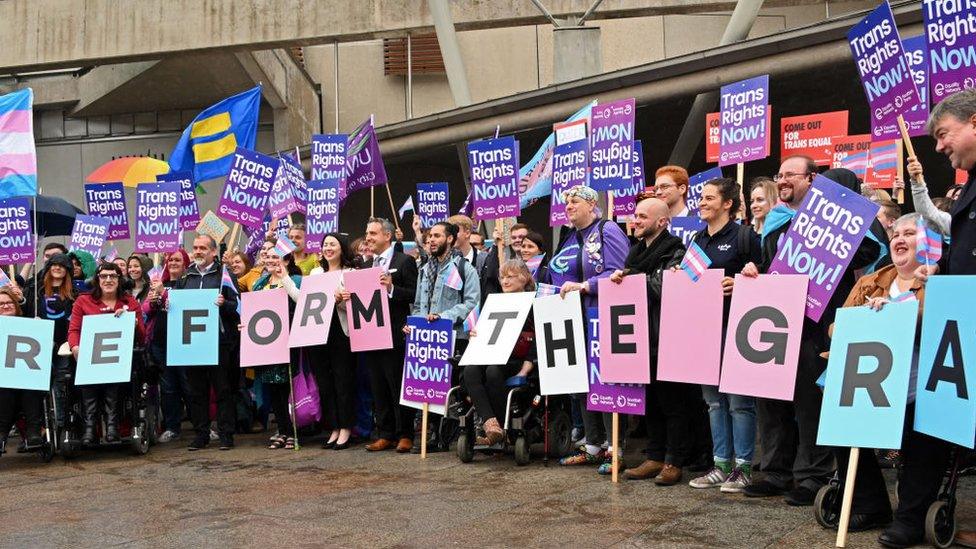
Trans rights campaigners have rallied outside Holyrood to call for reforms
4. Leadership
To start at Westminster, Boris Johnson still sits atop a comfortable parliamentary majority - but has started the new year as he ended the last, embroiled in questions about his future as prime minister.
He has faced backbench rebellion over Covid rules and a damaging by-election defeat, but the ongoing row over parties held at Downing Street during lockdown is the most potentially damaging of all.
Opposition parties have been baying for blood for weeks to little avail, but the fact fellow Conservatives are also lining up to give him a kicking means there are real questions about Mr Johnson's longevity in office.
There are particular questions for the Scottish Conservatives, who had already been distancing themselves from Mr Johnson - he played literally no part in their 2021 election campaign, while featuring on every other SNP leaflet.
And now that Douglas Ross has broken cover to call for his resignation as prime minister and Tory leader, there are serious questions for the Scottish party.
If Mr Johnson is not ousted, relations with Downing Street will have been seriously damaged - to the extent that longstanding calls for the Scottish Tories to separate themselves entirely from the UK-wide operation may need to be considered afresh.
"I offer my heartfelt apologies": Watch Boris Johnson admit to attending the No 10 party in May 2020
Circumstances are decidedly different at Holyrood, but speculation about Nicola Sturgeon's future has been rife for some time too - despite the prospect of five years of stability under an SNP-Green majority government.
Some of this is undoubtedly opposition mischief-making - she notes that other parties may as well fantasise about her walking away, having failed to lay a glove on her at the ballot box.
However, while dismissing the idea of leaving Holyrood when questioned about it directly, Ms Sturgeon also fuelled the rumour mill by flying a kite about life after politics in a Vogue magazine article, external shortly before spending a fortnight at COP26.
And in May, she will become Scotland's longest-serving first minister, as well as marking 23 years as an MSP - milestones which are sure to spark further talk of her legacy.
She is already the first minister who led Scotland through a pandemic, won back-to-back elections and who recently completed an overhaul of childcare trailed in her very first speech as SNP leader. The question is whether she feels she needs to deliver another independence referendum before considering her work is done.
Sturgeon: I'm going to be around a lot longer
5. Independence
Any effort to ramp up the rhetoric about a fresh push for indyref2 at the SNP conference in November was hastily shunted to the back burner by breaking news of a mutated variant of Covid-19 spreading rapidly across the globe.
But in a speech ultimately dominated by Omicron, Ms Sturgeon did pledge that in the spring the campaign for independence would "resume in earnest".
We have of course been here before. Most SNP conferences conclude with a similar rallying cry from the first minister - so are we really any closer to a referendum this year?
Ms Sturgeon's own phrasing is that she will do "everything that is within my power" to hold a referendum in 2023 - perhaps accepting that the issue is not entirely in her own hands - and that this timetable may require "an ideal set of circumstances".
She has been clear that she still wants to secure an agreement of some kind with the UK government, to ensure any vote has the legitimacy and international recognition to actually deliver independence.
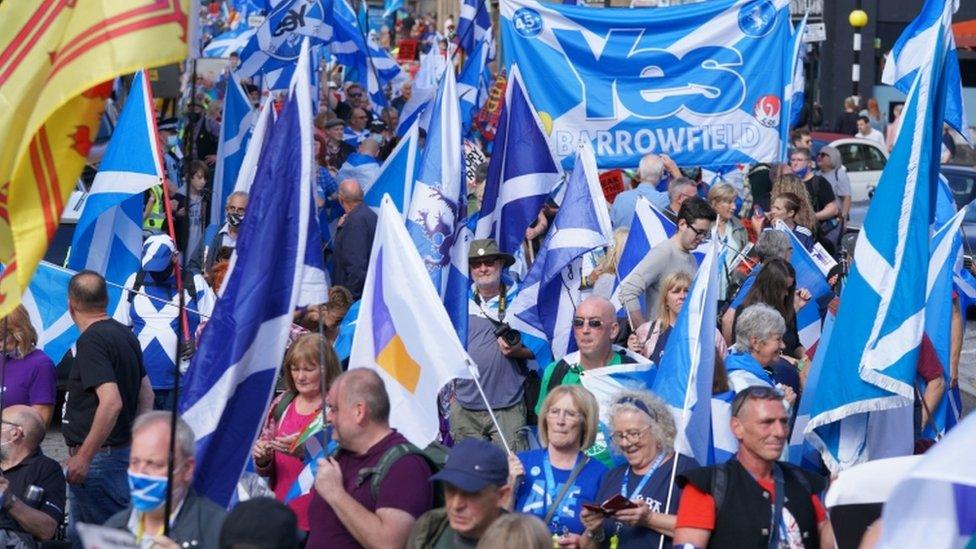
So it is probable that at some point Ms Sturgeon will make a fresh approach to the prime minister asking for a Section 30 order, a transfer of powers in the style of 2014. Mr Johnson has thus far looked unlikely to agree, and the uncertainty about his future is unlikely to change this.
The Scottish government has drawn up a draft bill for an independence referendum, and could introduce this at Holyrood at some point - although it did not feature in the Programme for Government for the term running up to the summer recess.
These are the only certainties, before you plunge into a bottomless rabbit hole of hypotheticals about what might happen if the bill were introduced and if it were to be challenged at the Supreme Court.
These questions give devotees of the constitutional debate something to chew over, and Ms Sturgeon will doubtless come up with some kind of campaigning work to focus the energies of the Yes movement.
However, it seems unlikely that anything more concrete is on the immediate horizon. Look forward to this topic featuring again in the 2023 edition of this article.